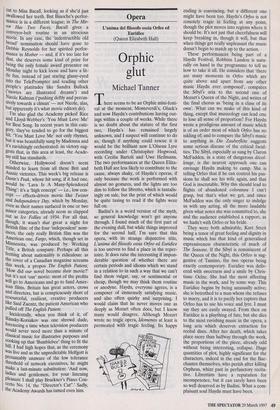Whose film is it anyway?
Mark Steyn on the winners and losers at the 69th Academy Awards
Despite Columbia's best efforts to mis- place his invitation, the celebrated pornog- rapher Larry Flynt and his gold-plated wheelchair made it to Monday's Oscars. So did the ailing Mohammed Ali, and also David Helfgott, the pianist who's put the loon in Clair de Lune to such lucrative effect. Ali was allowed up on stage, Helf- gott got to play the piano, but Flynt was kept firmly in the stalls. I don't know why: both Helfgott's Shine and The People Vs. Larry Flynt are inspirational tales of recov- ery against the odds — one from mental breakdown, one from a botched contract killing. Despite his handicap, Helfgott came back to triumph as a concert pianist who's big down under; despite his handi- cap, Flynt came back to triumph as a pub- lisher of nude spreads of pre-op transsexual hookers who are big down under. Helfgott was allowed to demon- strate his recovery to Hollywood by playing 'The Flight of the Bumblebee'; Flynt should have been allowed to demonstrate his recovery by bringing on one of his favourite photographic models for a few quick bottom shots — the Bum of the Flighty Bea. Hollywood's problem is that the only human interest stories it's interest- ed in involve humans the rest of us don't want to go anywhere near — the Flynts rather than the Helfgotts. On Monday night, it temporarily shifted its priorities, but doubtless by Tuesday morning it Was back to business as usual.
Still, in the year of Shine and Sling Blade, the Academy seemed to have developed its own case of schizophrenia, bringing on its biggest stars to introduce nominees who are household names only in the sense that, like our own Brenda Blethyn and Marianne Jean-Baptiste, they'd seem more at home in a household. The tone was nicely caught by Billy Crystal in his musical synopses of the Best Picture nominees, using the Brady Bunch theme song to explain the plot of Mike Leigh's Secrets and Lies. It wasn't the Flight but the Attack of the Bumbling 'B's: low-budget, no-star pictures made, although they're usually touted as 'independents', by minor subsidiaries of the big studios. Most of the decisions were the right ones. Juliette Binoche, picking up her Oscar for The English Patient, made what was (probably unintentionally) the cruellest remark of the evening when she said 'we all assumed Lauren would win'. The camera cut to Miss Baca11, looking as if she'd just swallowed her teeth. But Binoche's perfor- mance is in a different league; in The Mir- ror Has Two Faces, Bacall gives a conveyor-belt routine in an atrocious movie. In any case, the 'indestructible old broad' nomination should have gone to Debbie Reynolds for her spirited perfor- mance in Mother — and, if it's too late for that, she deserves some kind of prize for being the only female award presenter on Monday night to kick loose and have a lit- tle fun, instead of just staring glassy-eyed into the TelePrompter and reading other People's platitudes like Sandra Bullock ('movies are illustrated dreams') and Nicole ICidman ('pushing deftly and percus- sively towards a climax' — not Nicole, alas, but apparently it's what movie editors do). I'm also glad the Academy picked Rice and Lloyd-Webber's 'You Must Love Me' for Best Song. In recent years in this cate- gory, they've tended to go for the biggest hit. 'You Must Love Me' not only rhymes, but it was beautifully sung by Madonna and it's ravishingly orchestrated: its victory sug- gests that, in this area at least, the Acade- lny still has standards.
Otherwise, Hollywood doesn't seem minded to learn from all these Brit and Aussie victories. This week's big release is Dante's Peak, whose hit song, if it had one, Would be 'Lava Is A Many-Splendored Thing': it's a 'high concept' — i.e., low con- cept — effects-driven movie like Twister and Independence Day, which by Monday, even as their names surfaced in one or two minor categories, already seem as clapped out as Ice Follies of 1934. For all that, though, it wasn't that great a night for British film: of the four 'independent' nom- inees, the only really British film was the American one, Fargo, which, though set in Minnesota, was produced by Working Title, a British company. Perhaps all this fretting about nationality is ridiculous: as the cover of a Canadian magazine screams this week, a propos The English Patient, How did our novel become their movie?' but it's not 'our' movie: most of the profits Will go to Americans and go to fund Amer- ican films. Britain has great actors, crews and directors, but is conspicuously short of resourceful, resilient, creative producers like Saul Zaentz, the patient American who Pulled off The English Patient. Incidentally, when you think of it, ol' foreseeing was one shrewd dude, toreseeing a time when television producers Would never need more than a minute of classical music for illustrative purposes and ,c?oking up that 'Bumblebee' thing to fit the mil. I had high hopes that, as the ceremony Was live and as the unpredictable Helfgott is Presumably unaware of the low tolerance threshold of network executives, he might make a last-minute substitution: 'And now, ladies and gentlemen, for your listening Pleasure I shall play Bruckner's Piano Con- certo No. 14, the "Director's Cut".' Sadly, the Academy Awards has tamed even him.



































































 Previous page
Previous page